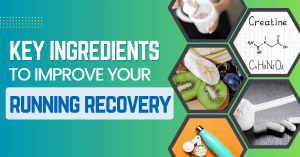Now that you know you need to watch your sugar intake after reading The Truth about Sugar for Runners, your next question may be, is there a healthy alternative to sugar?
We have all seen the yellow, blue and pink packets sitting on the table at restaurants, and most of us know by now, that the pink and blue packets, Sweet n’ Low and Equal (from the Mayo Clinic), are not healthy options to replace sugar. Have you wondered about the yellow packet, Splenda? Is it a new, healthy option? Will it help you reach or maintain your race weight?
A number of sports nutrition companies are using it to sweeten their product, so it’s important you understand the pros and cons of splenda so you can make healthier choices. Here is a look at what is inside the yellow packet and the answer to the question: is there a healthy replacement for sugar?
What’s in the yellow packet
The bright yellow packet is Splenda, also know as Sucralose. Sucralose is made by chlorinating sugar. In a lab, scientists simply took a sugar molecule and removed three hydroxyl groups, which are hydrogen and oxygen bonded together, and replaced them with three chloride atoms, which are then treated with methanol, a wood alcohol.
The chloride our body is accustomed to processing typically comes bound to another electrolyte, like sodium or magnesium. We actually get plenty of chloride in our diets from all the salt we consume, so this extra chloride is not necessary, and in some cases, harmful.
Chloride bonded to sugar molecules, through an unnatural process, is not a substance our bodies were meant to consume. Like any foreign substance that makes its way into your system, your body will instinctively fight it.
What research says about how the body reacts to splenda
A study done by Duke University, found that the intestinal tracts of rats fed Splenda contained 50% less good bacteria and had a higher pH, compared to the control groups intestinal tracts. They also found increased body weight in the group fed Splenda.
Other research studies done on animals with sucralose/Splenda have found:
* Shrunken thymus glands (up to 40% shrinkage)
* Enlarged liver and kidneys.
* Atrophy of lymph follicles in the spleen and thymus
* Enlarged cecal and pelvic hyperplasia (swelling of the pelvic region)
* Reduced growth rate
* Decreased red blood cell count
* Hyperplasia of the pelvis
* Extension of the pregnancy period
* Aborted pregnancy
* Decreased fetal body weights and placental weights
* Diarrhea
You may be wondering why I am sharing results from animal studies and not human trials. Unfortunately, there has been little to no research studies conducted on the human body’s reaction to to Splenda.
The few “studies” that are available are short term studies (2-4 weeks long), on small groups of people, supported by Johnson & Johnson (the company that owns the rights to Splenda). These factors diminish the quality of a study. Due to this lack of appropriate research, the use of Splenda/sucralose has not been approved in most European countries. However, it is readily available in the United States.
In addition to these animal studies, there are numerous reports from individuals who have experienced issues with products containing splenda/sucralose. My Family being among those who have experienced the adverse affects of sucralose.
Why you should avoid splenda if you’re a runner
As you can tell, I am not a fan, and I believe sucralose/Splenda could be detrimental to your running and training health.
Chloride in an unnatural bond is not a substance that our bodies were meant to consume (am I repeating myself?). Unnaturally bonded chloride can wreck havoc on your intestinal tract by killing the good bacteria your stomach produces. Killing the good bacteria in your intestines weakens your immune system. Weakening your immune system through the food you consume, in addition to intense training runs and a busy lifestyle, leaves your body susceptible to bacteria and disease.
For most of us, getting sick while training for our PR is simply not an option, so we need to do everything in our power to keep our immune systems strong!
Moreover, the stress of running leaves the body susceptible to yeast overgrowth, like Candida, in the intestinal tract and other areas of the body. A yeast overgrowth can result in symptoms such as fatigue, joint pain, muscle aches, and athletes foot. None of which will help you run faster or train harder! As a runner, you rely on, and need, the good bacteria splenda is killing even more than the average person.
Along with killing your good bacteria, the chloride molecules in sucralose/Splenda can also be a cause of GI distress. Have you ever had a Diet Coke for lunch, and couple of hours later went for an afternoon run, only to feel bloated and gassy the entire run? If you have a running journal, or you track your food intake, do an experiment for yourself. Run three days, 1-2 hours after you have a Diet Coke (or any other drink sweetened with Splenda/sucralose), then run three more days, in a row, without that beverage. See if you feel a digestive difference!
Check the label
Splenda is in many sports endurance nutrition products under the name of sucralose. It is in protein mixes, electrolyte drinks, endurance bars and many common recovery products. I suggest you become a label reader, look for and avoid sucralose in any product you purchase.
What can you do?
The safest and healthiest option when it comes to sweetening foods is…not sweetening foods. In America, our taste buds addicted and trained to want sugar. The best thing you could do for yourself is reduce the amount of sugar and artificial sweeteners you consume, which actually retrains your taste-buds to not crave sweet. This approach prevents the weakening of your immune system from too much sugar or too much Splenda. Often three days completely off of sugar, artificial sweeteners, and highly processed carbohydrates can help reduce the sugar cravings immensely.
Refraining from these foods for six weeks can help establish healthier habits and retrain your taste buds to more naturally sweet foods, like fruit.
Is there a safer sugar substitute
Even if you make the diet changes, sometimes just a hint of sweet is refreshing and even needed. If this is the case I would recommend using an herb called Stevia.
Stevia is derived from a herb in the sunflower family. Central and South American people have used Stevia as a natural sweetener for over 1,500 years without serious health effects.
However, I still don’t believe stevia is the magic sweetener everyone is looking for to replace sugar. Stevia can have a bitter after taste, and too much stevia can cause minor digestive issues like gas and bloating. The bloating and gas arise from the body’s inability to break down the herb, which is what makes the product calorie free. Stevia is considered to be 300 times sweeter than sugar, so a little bit goes a long way.
To run your best, with little to no digestive discomfort, and actually boost your immune system, reduce your sugar and sugar substitute intake. But for those days when you crave just a hint of sweet, Stevia is the healthiest sugar alternative I have found! Let me know if you have questions or share your experiences with splenda.
Resources:
Browning, Lynnley (2008-09-02). “New Salvo in Splenda Skirmish”. The New York Times. Retrieved 2010-05-24.
Lord, G. H. “Sucralose Causes Bowel Enlargement, Kidney Mineralization and Abnormal Pelvic Tissue Changes in Rats. – GreenMedInfo Summary.” Sucralose Causes Bowel Enlargement, Kidney Mineralization and. Green Med Info. Web. 16 May 2012. .
“Sucralose (Splenda) Toxicity Reaction Case Reports.” Sucralose (Splenda) Toxicity Information Center. Web. 09 May 2012.







